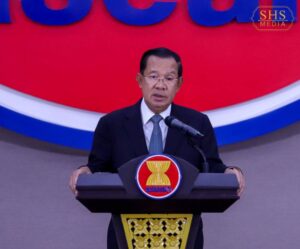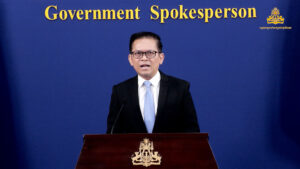Selected Comments Samdech Moha Bovor Thipadei Hun Manet, at the inauguration ceremony of the Toyota Tsusho Manufacturing (Cambodia) Co., Ltd., (“TTMC”) [Unofficial translations]
![Selected Comments Samdech Moha Bovor Thipadei Hun Manet, at the inauguration ceremony of the Toyota Tsusho Manufacturing (Cambodia) Co., Ltd., (“TTMC”) [Unofficial translations]](https://grandnewsasia.com/app/uploads/2024/05/photo_2024-05-02_09-16-46.jpg) Selected Comments Samdech Moha Bovor Thipadei Hun Manet, at the inauguration ceremony of the Toyota Tsusho Manufacturing (Cambodia) Co., Ltd., (“TTMC”) [Unofficial translations]
Selected Comments Samdech Moha Bovor Thipadei Hun Manet, at the inauguration ceremony of the Toyota Tsusho Manufacturing (Cambodia) Co., Ltd., (“TTMC”) [Unofficial translations]
[1]
His Excellency (Ambassador) UENO Atsushi and I have met many times since the new government was born, and every time we meet, there is always a new achievement. Yesterday, we met at Sihanoukville Autonomous Port at the celebration of phase-I expansion of SAP preparing it to be a regional port and regional logistics hub with the support of the Government of Japan. Today we inaugurate the Toyota assembly line and assembly plant, a Japanese private sector investment. We will continue to meet with more new achievements. I hope to see you many more times (while you represent the people and government of Japan) in Cambodia.
[2]
My official meeting with the Japanese leaders, including Prime Minister Kishida Fumio and Japanese private sector leaders, both in Japan and in Cambodia, aims to encourage more Japanese companies to continue investing in Cambodia. This work is a continuation of the efforts of Samdech Techo, who the previous terms, has led relations with Japan and encouraged Japanese investments in Cambodia. We have a lot of big Japanese companies like Minebea (Cambodia), Aeon Mall, and now Toyota, all of whom have invested and expanded their investments in Cambodia.
[3]
(1) Toyota – the symbol of success, coexistence, creation and increase of investments
The Toyota logo came to Cambodia in 1990 and began providing services in 1993 (for a period of 31 years) as of present. Starting from a company that only provides repair services as at that time many Toyota cars were used by UNTAC, now we have reached the establishment of (the Toyota automobile) assembly line and manufacturing plant. This is something that while the Royal Government strives to attract new (investment), it also strives to make those existing companies/investors successful and comfortable to stay longer with Cambodia, while creating investment and expanding investments thank to the trust they have in Cambodia […]
[4]
(2) Transferring technology and skills in two forms – infrastructure and machinery and human resource training
Establishing such a high-tech factory brings about job creation is one thing, but providing the ability to transfer technology from Japan to Cambodia is another. Technology transfer takes place in two forms. The first form is in infrastructure and machinery. The second form is human. Today, we have jobs for 150 people. In the future, we may have more. All of them have received step-by-step training and need to transfer more skills from their work experience here. The second is to provide additional training opportunities. I would encourage the company to develop its vision in the training platform. Let the company open the opportunity for Cambodian youth to come here for internship and job exposures […]
(3) Create opportunities and types of jobs to transform productivity and potential
I would encourage and support the concept of establishing a company training platform in the automotive sector. Mechanical engineering in the automotive industry is the main priority ahead. We transform the productivity and potential of our people, not only to create job opportunity, but the kind of work that is needed. We have shifted from cattle-based agriculture to agroindustry to mechanized agriculture. We are reaching out to boost manufacturing, tourism, and light industry […]
(4) Cambodia must have the ability to produce and export semi-finished and finished products
In the days to come, we can prepare for heavy production/industry. When we have human resources, we will ensure sustainability as well as raise the living standards of the people. We are not a country that has to export raw materials only. We need to be able to produce semi-finished and finished products for export to ensure better prices for the Cambodian people […] We will one day not export raw materials and import finished products. We have the right to produce and supply own market […] Though we have not been able to create a production line from the beginning, such as steel, but we can assemble and install the cars here […]
(5) With human resources understanding the machinery industry Cambodia can attract more investments
If Cambodia has human resources able to command robots, understand the machinery industry, the future can be more attractive because there are already human resources and no need to spend time recruiting new people. Productivity, production costs and investment decisions are big tasks (for investors). The companies that make/assemble cars here do not act as companies for production alone, but also training human resources and encourage the sector to grow in Cambodia […]
(6) More taxes, training and salaries, and locally made cars
Now, part of the revenue is falling because some cars (that we used to import) have come to start production locally or the customs duty on imported cars is a bit lower (than it used to). However, look at it as the money goes out of the left pocket and comes in the right pocket. When investors came to set up a company in the country, they bring in progress, jobs, incomes, and taxes […] (secondly,) when they offer skills training and salaries to people, and our people have the ability to increase their livelihood and to buy more things, the action of which comes into our economy. Thirdly, the Cambodians would be able to (find cars manufactured) in the Cambodian market […]
(7) From importing everything and supplying apparels to producing high quality cars at reasonable prices
From being a country that used to be importing everything, now we are producing many by ourselves. We used to supply beverages, clothes, and now we have reached a stage that we are assembling cars to supply the market. Although it is not a local company, it is still a company that makes high quality local products at affordable prices for our people […] Improving people’s living standards is not only increasing their salaries, but also keeping costs low so that they can afford to buy more and save money for other things […]
(8) The presence of the Toyota car assembly plant benefits the national economy, enhances productivity and prestige – the pride of the nation
Today’s inauguration (of Toyota Tsusho Manufacturing (Cambodia) Co., Ltd. – “TTMC”) will greatly benefit the national economy and the people, increase productivity and enhance the prestige of Cambodia, the national pride of our people […] The Royal Government will strive to promote the training of human resources to increase ability to attract more investors. I welcome Japanese friends to continue to develop the country together. Toyota has been together for 31 years. Hopefully (on the 130th anniversary,) there will be a Prime Minister to celebrate an even bigger event. We are always moving forward. (In the history of) the two countries’ relations, we have inaugurated many achievements on the 71st anniversary. We will continue to have more investment opportunities, both domestic and foreign, to work together […]
[6]
(9) Examine the possibility of creating backwards linkage opportunities for local companies/handicrafts
(Speech: […[ Let’s examine the possibility of expanding the use of local products and contents]. Comments – initially, we use a lot of external components for the assembly. But a car company needs thousands of parts. Looking into the factory backwards linkage, we can reach the opportunity to supply, for instance, screws or to supply car mattresses so that (TTMC does not have to import) from outside. We are creating jobs for other local companies/handicrafts […] among the few hundred items, there may be products that we can depend on local handicraft shops […] TTMC does not have to make them all by themselves. Establishing partnership with local companies or sometimes handicraft shops for some of the items – for instance the car seats cover […]
(10) Consider the policy of connecting production lines and motivating the company
Cambodia pays close attention to SMES because they are capable of acting in the supply chain. We now have TTMC and five other (automotive) companies. We can create a supply chain. Let the Ministry of Industry, Science, Technology, and Innovation, which is in charge of SMES, consider and formulate a policy so that we can connect (this production chain). We provide an incentive policy for TTMC to encourage smaller companies to connect as a local supply chain […] and open up opportunities for the private sector to be a supporter, help supply, provide opportunities to help create jobs, and boost the economy […]
(11) Increase production capacity to become a regional supply hub
The toad is always leaping forward (no matter how people make a joke of it) […] in the near future, we (will have) the productive capability to become the hub of supply of car parts in the region. For example, Vietnam or Thailand may have growing industries, but they may have some of the industries that need to outsource. We can produce and supply […] in some instances, we can produce components for companies/manufacturers in Japan and/or other countries […] we do not need to produce the whole product in Cambodia. We can start by making parts of the components. Cambodia does not need to build the whole helicopters, but some parts of the helicopters can be made in Cambodia. For instance, we can produce mattress or a belt for it […]./.






